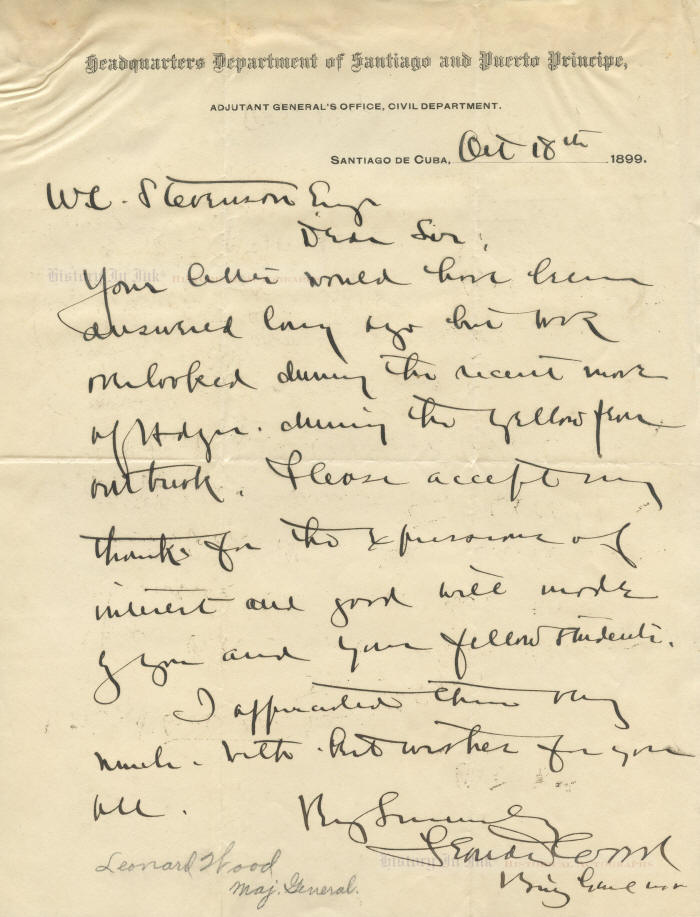1007395
Leonard Wood
Scroll down to see images of the item below the description
”Your letter . . . was overlooked during the recent move of Hdqrs. during the yellow fever outbreak”
Leonard Wood, 1860–1927. Major General, United States Army; Governor-General of Cuba, 1899–1902; Governor-General of the Philippines, 1921–1927; recipient, Congressional Medal of Honor. Autograph Letter Signed, Leonard Wood / Brig. Genl USA, one page, 8" x 10½", on stationery of the Headquarters Department of Santiago and Puerto Principe, Adjutant Generalʼs Office, Civil Department, Santiago, Cuba, October 18, 1899.
This is a very scarce handwritten letter by Wood—and a rare piece from the American occupation of Cuba. Wood, along with Theodore Roosevelt, formed the "Rough Riders" during the Spanish-American War. Writing shortly before he became Governor-General of Cuba, Wood responds to a request for handwritten letter for one of several autograph albums to be devoted to the country's prominent men and women. He writes, in full: "Your letter would have been answered long ago but was overlooked during the recent move of Hdqrs. during the yellow fever outbreak. Please accept my thanks for the expressions of interest and good will made by you and your fellow students. / I appreciated them very much. With best wishes for you all. / Very sincerely . . . ."
Yellow fever, to which Wood refers in this letter, caused extremely large losses of life during the Spanish-American War. The disease is a viral one that can cause liver damage, resulting in jaundice. A team of Army physicians led by Dr. Walter Reed confirmed the hypothesis of a Cuban physician, Dr. Carlos Finlay, that the yellow fever virus is transmitted by mosquitoes, which explains why the disease occurs mostly in tropical climates. Using methods that Finlay suggested, the Army and the United States government eradicated yellow fever from Cuba and, later, from Panama, which allowed completion of the Panama Canal.
Wood was the first medical officer to become the Army Chief of Staff. An 1884 graduate of Harvard Medical School, he served in the American West and received the Medal of Honor for service with the expedition that captured the famed Apache leader Geronimo. Wood served as the personal physician to Presidents Grover Cleveland and William McKinley. When the Spanish-American War began in 1898, then-Colonel Wood and Theodore Roosevelt, who resigned as Assistant Secretary of the Navy, recruited and formed the 1st Volunteer Cavalry, which became known as the "Rough Riders." Wood commanded the unit, with Roosevelt second in command, at Las Guasimas and San Juan Hill.
Wood wrote this letter shortly before he was appointed military governor of Cuba. As governor, he worked to improve medical and sanitary conditions in Cuba and instituted a number of political, social, and educational reforms modeled on the Progressive movement in the United States. He was promoted to brigadier general and transferred to the Philippines, where he commanded the Philippines Division and served as governor of Moro province. He was promoted to major general in 1903.
In 1910, President William Howard Taft appointed Wood, whom he met when Taft was Governor-General of the Philippines, to be the Army Chief of Staff. Wood was instrumental in turning the Army into a modern fighting force. Wood decried the lack of preparedness during the Spanish-American war. He started a program that resulted in the Reserve Officer Training Corps, the ROTC, and promoted the Preparedness Movement, a campaign, led by Republicans, to strengthen the military for defensive purposes after World War I began in Europe. He pushed development of the Maneuver Division and the Mobile Army concept, giving the Army its first truly combined arms divisions that enabled it to fight as a force during World War I.
Democratic President Woodrow Wilson replaced Wood as Chief of Staff in 1914. Wood ran unsuccessfully for the Republican presidential nomination in 1920. But President Warren G. Harding appointed Wood, who retired from the Army, as Governor-General of the Philippines in 1921, a position that he held until his death in 1927.
Wood was awarded the Armyʼ Distinguished Service Medal in 1919. He is memorialized in the Armyʼs Fort Leonard Wood, which is located in south central Missouri. Fort Wood, which was created in 1940, was originally an infantry training facility and interned German and Italian prisoners of war during World War II. Today it is home to the Maneuver Support Center of Excellence, which trains and educates service members and develops doctrine and capabilities for three U.S. Army schools, the Chemical, Biological, Radiological, and Nuclear School, the Engineer School, and the Military Police School. It trains nearly 80,000 military personnel and civilians annually.
Our search of auction records has found no other handwritten letters by Wood sold at auction since 1975. This letter comes from a large collection that a professor of penmanship at the State Normal School at Emporia, Kansas, now Emporia State University, assembled in the 1890s. The professor, to whom Wood addressed this letter (although he referred to "you and your fellow students"), had his students contact prominent American men and women to request handwritten letters containing a reminiscence, a favorite sentiment, or a word of advice for the albums.
Wood has written and signed this letter in bold, black fountain pen. The letter has normal mailing folds, and it has some rippling in the upper corners and mounting remnants at the top of the back. There is a pencil notation in another hand identifying Wood in the blank lower left margin. Overall the letter is in fine condition.
Unframed.
Click here and scroll down the American History page to see other American military items.







